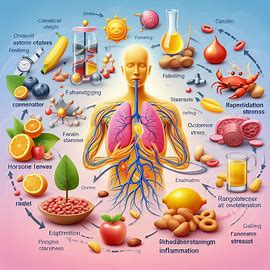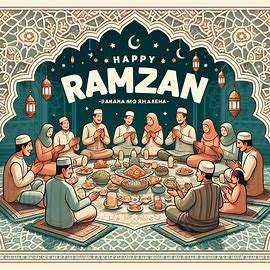Unveiling Ramadan Myths: Separating Fact from Fiction
Ramadan myths are always far behind in revealing the truth. The holy month for Muslims, is a time of spiritual reflection, self-discipline, and increased devotion. However, several misconceptions surround this sacred practice. In this article, we’ll address these myths of Non-Muslims and Muslims and provide accurate information about Ramadan fasting.

Ramadan Myths
Non-Muslims
Myth 1: Ramadan Is a Month of Pure Hardship
Fact: While Ramadan involves self-discipline and sacrifice, it is far from being a month of pure hardship. Let’s explore the multifaceted aspects of this sacred time:
- Spiritual Fulfillment: Ramadan provides an opportunity for spiritual growth, reflection, and connection with God. Muslims engage in extra prayers, recite the Quran, and seek forgiveness. The sense of closeness to the Divine brings immense joy.

Aftar Gathering.at Masjid e Nabvi, Madina. 2 - Community Bonding: Far from isolation, Ramadan fosters community spirit. Families gather for Iftar (the evening meal to break the fast), sharing laughter, love, and gratitude. The communal experience strengthens bonds.

Aftar Community Bonding -

Charity and Compassion Charity and Compassion: Ramadan encourages acts of kindness and generosity. Muslims give to charity (Zakat) and help those in need. The joy of giving and making a positive impact outweighs any hardship.
- Physical Benefits: Fasting has health benefits, including detoxification, weight loss, and improved metabolism. The body adapts, and many find increased energy during fasting hours.
- Culinary Delights: Preparing special dishes for Iftar and Suhoor (pre-dawn meal) becomes a

Aftar Delights delightful tradition. The anticipation of breaking the fast with loved ones adds joy to the month.
- Nightly Prayers (Taraweeh): Muslims gather at mosques for Taraweeh prayers. These serene moments of worship bring peace and fulfillment.
In summary, Ramadan is a holistic experience that combines devotion, community, and personal growth. It’s a time of joy, reflection, and celebration.
Myth 2: It’s only for the Physically Fit; it’s Detrimental to Health
Fact: This myth perpetuates the misconception that fitness and health are synonymous. Let’s debunk it:
- Fitness vs. Health:
- Fitness refers to physical attributes like cardiovascular endurance, muscular strength, flexibility, and body composition.
- Health, on the other hand, encompasses overall well-being—physical, mental, and emotional aspects.
- Appearance Isn’t Everything:
- Looking fit externally doesn’t guarantee internal health.
- A person can appear muscular, have six-pack abs, and work out regularly but still harbor emotional turmoil, sleep deprivation, and toxicity.
-

Reducing Inflammation and Oxidative Stress Metabolic Health Matters:
- Even if someone has a normal body weight (BMI around 25), they can be “metabolically obese”.
- Metabolic health considers factors beyond weight, focusing on optimal bodily functions and mental clarity.
- Holistic Well-Being:
- True health aligns with mind, body, and spirit.
- Balance, flexibility, kindness, and compassion contribute to overall health.
Remember, being fit doesn’t automatically mean being healthy. Prioritize holistic well-being over external appearances
Myth 3: EVERYONE HAS TO FAST – NO EXCEPTIONS
Fact: While fasting during Ramadan is a fundamental obligation for most adult Muslims, there are valid exceptions. Let’s explore them:
- Children: Prepubescent children are not required to fast. They gradually learn about fasting and begin practicing as they mature.
- Elderly and Ill: Elderly individuals, especially those with health conditions, may be exempt. Fasting could harm their well-being. Instead, they can provide charity (fidya) to compensate.
- Pregnant and Nursing Women: Pregnant or nursing women can choose to fast if it doesn’t endanger their health or the baby’s. If it does, they can make up for missed fasts later or provide fidya.
- Travelers: Travelers can postpone fasting and make up for missed days later. The intention matters; if they intend to fast, they can. Otherwise, they can break their fast.
- Menstruating and Postpartum Women: Women experiencing menstruation or postpartum bleeding are exempt from fasting. They can make up for missed days afterward.
- Mentally Incapacitated Individuals: Those with mental health issues or cognitive impairments are not obligated to fast.
In summary, Islam recognizes individual circumstances, emphasizing mercy and understanding. Fasting remains a personal commitment, but exceptions exist for valid reasons.
Myth 4: Non-Muslims Can’t Eat in Front of Muslims during Fasting Hours
Fact: This is a common misconception. In reality, non-Muslims are not prohibited from eating or drinking in front of Muslims during fasting hours. Here’s why:
- Respect and Understanding: Islam encourages mutual respect and understanding among people of different faiths. Non-Muslims are not expected to fast during Ramadan, and Muslims understand this.
- Courtesy: While it’s considerate for non-Muslims to be mindful of their Muslim friends or colleagues who are fasting, there is no strict rule preventing them from eating or drinking openly.
- Exceptions: There are exceptions. For instance, if you’re in a predominantly Muslim country or attending a religious event, it’s polite to avoid eating in public during fasting hours out of respect for local customs.
- Common Etiquette: Non-Muslims can show empathy by being discreet or choosing not to eat elaborate meals in front of fasting individuals. However, simple snacks or drinks are generally acceptable.
In summary, the idea that non-Muslims cannot eat in front of Muslims during Ramadan is a misconception. Respect, understanding, and courtesy prevail, allowing everyone to coexist harmoniously.
Myth 5: It’s Just About Not Eating or Drinking
Fact: While abstaining from food and drink during daylight hours is a significant aspect of Ramadan fasting, it’s essential to recognize that Ramadan encompasses much more. Here are some key points to dispel this misconception:
- Spiritual Reflection: Ramadan is a time for deep spiritual reflection, self-improvement, and increased devotion. Muslims engage in extra prayers (Salat), recite the Quran, and seek forgiveness.
- Charity and Generosity: Fasting encourages empathy for the less fortunate. Muslims are encouraged to give to charity (Zakat) and perform acts of kindness. The act of fasting fosters compassion and generosity.
- Self-Discipline: Beyond refraining from food and drink, fasting teaches self-discipline. It involves controlling desires, avoiding negative behavior, and practicing patience.
- Community and Togetherness: Ramadan brings families and communities together. Muslims break their fasts with loved ones during Iftar (the evening meal) and share the pre-dawn Suhoor meal.
- Seeking Forgiveness: Muslims believe that during Ramadan, the gates of heaven are open, and God’s mercy is abundant. It’s a time to seek forgiveness and strengthen one’s relationship with God.
In summary, Ramadan is a holistic experience that encompasses physical, emotional, and spiritual dimensions. It’s not merely about abstaining from food and drink; it’s a transformative journey of the heart and soul.
Myth 6: If Not Observed/Seen by Anybody One Can Eat and Drink:
We admire the loyalty of non-Muslim friends who are happy to sneak us some food without our parents realizing. But the only issue is they can’t hide it from God! If you can find a way to hide it from God, by all means, go for it. If you manage to complete Ramadan, you can do what you want. No.
Myth 7: You Cannot Groom While Fasting
Fact: This myth is not accurate. During Ramadan fasting, grooming is permissible. Here are some clarifications:
- Washing Hair: It’s perfectly acceptable to wash your hair during fasting hours. Just ensure that you don’t intentionally swallow any water that falls on your face.
- Grooming Activities: Feel free to groom yourself to look prim and proper. Cutting hair, trimming nails, and maintaining your beard are all allowed during fasting.
Remember, Ramadan is about spiritual growth, but it doesn’t restrict basic hygiene or self-care.
Myth 8: Fasting for Muslims to Realize, What it’s Like to Be Poor
Fact: The purpose of fasting during Ramadan is not to simulate poverty but rather to deepen spiritual awareness, empathy, and self-discipline. Let’s explore this further:
- Spiritual Connection: Fasting is an act of worship prescribed by Islam. It aims to strengthen the connection between the individual and God. Muslims fast as an act of obedience and devotion.
- Self-Discipline: Fasting teaches self-control, patience, and restraint. By abstaining from food, drink, and other physical desires during daylight hours, Muslims cultivate discipline and mindfulness.
- Empathy and Compassion: While fasting, Muslims become more empathetic toward those who are less fortunate. It reminds them of the hunger and thirst experienced by those in need. This empathy encourages acts of charity (Zakat) and kindness.
- Gratitude: Fasting fosters gratitude for the blessings of food, water, and comfort. It reminds Muslims to appreciate what they have and be thankful.
In summary, Ramadan fasting is a spiritual practice that goes beyond material deprivation. It serves as a reminder of faith, compassion, and gratitude.
Ramadan Myths
Muslims
Myth 1: Fasting People Need Not Go to School /Work
Fact: Fasting during Ramadan does not exempt individuals from their regular responsibilities, including work or school. Here’s the reality:
- Balancing Act: Muslims who fast during Ramadan continue with their daily routines. They wake up early for Suhoor (pre-dawn meal), perform their prayers, and then head to work or school.
- Productivity and Devotion: Ramadan encourages productivity and devotion. Fasting doesn’t hinder professional or educational commitments; rather, it enhances focus and discipline.
- Understanding Employers and Educators: Many employers and educational institutions are understanding during Ramadan. Muslims may adjust their schedules slightly to accommodate prayer times and fasting needs.
- Community Support: Colleagues, classmates, and teachers often show empathy and support during this month. It’s a time of community bonding.
In summary, fasting individuals continue their regular activities during Ramadan, balancing spiritual devotion with work or study.
Myth 2: Chew Gum in Ramadan is Not Prohibited
Fact: Chewing gum during Ramadan is not permissible while fasting. Although gum is not consumed in the conventional sense of swallowing, it involves mastication, which raises questions about its permissibility. Here’s why:
- Dissolution and Nutrients: Chewing gum contains sugars and artificial flavors. When chewed, these substances dissolve with saliva, potentially entering the stomach. In Islamic jurisprudence, ingesting any substance during fasting hours is critical, as it could invalidate the fast.
- Resemblance to Eating: Chewing gum closely resembles eating, which can lead to misunderstandings and accusations against the fasting individual. Even the suspicion of breaking the fast should be avoided.
- Alternatives for Oral Hygiene: Instead of gum, consider alternatives for oral hygiene and breath freshening during fasting hours. Options include using a Miswak (natural teeth-cleaning twig), mouth rinsing with water or mouthwash, and using toothpaste.
In summary, to maintain the sanctity of your fast, refrain from chewing gum during Ramadan.
Myth 3: During Ramadan, Satan Cant Dare Touch Me
Fact: The belief that Satan is completely incapacitated during Ramadan is a common misconception. Let’s clarify:
- Chained Devils: Islamic tradition holds that during Ramadan, the devils (Shayateen) are chained up, preventing them from directly influencing humans. This restraint is a mercy from God to facilitate worship and spiritual growth.
- Internal Whispers: However, the inner devil (Nafs) remains active. It continues to whisper temptations and negative thoughts. These whispers can still affect the heart and mind.
- Vigilance Required: While external demonic influence is minimized, individuals must remain vigilant against their inner inclinations. The effects of past influences persist, and self-awareness is crucial.
- Seeking Refuge: Muslims are encouraged to seek refuge in God from Satan’s influence by reciting specific prayers (such as Ayat al-Kursi) and maintaining mindfulness.
In summary, while Satan’s direct influence is curtailed during Ramadan, internal struggles persist. Spiritual awareness and seeking God’s protection remain essential.
Myth 4: Marriages are Forbidden during Ramadan
Fact: Contrary to the myth, marriages are allowed during the month of Ramadan. Islamic law does not prohibit marriages at any time of the year. However, there are some considerations:
- Self-Control: The person who is fasting during Ramadan must refrain from eating, drinking, and having intercourse from dawn until sunset. If self-control can be maintained during the fast, and there is no fear of breaking any fasting rules, getting married during Ramadan is permissible.
- Caution for Newlyweds: It’s essential to exercise caution, especially for newlyweds. There is a concern that they may not be patient and might engage in forbidden acts (such as intercourse) while fasting, leading to grave sin.
- Expiation for Intercourse: If a married couple engages in intercourse during fasting hours, they must make up for that day’s fast and offer the appropriate expiation. The expiation can involve freeing a slave (if not possible, then fasting for two consecutive months), or feeding sixty poor persons.
In summary, while marriages are allowed during Ramadan, couples should maintain moderation and adhere to fasting rules.
Myth 5: Accidentally Eating or Drinking Breaks the Fast
Fact: Accidental consumption during fasting does not invalidate the fast. Here’s why:
- Intention Matters: Fasting is an intentional act of worship. Accidental actions do not affect the validity of the fast.
- Forgiveness and Mercy: Islam emphasizes God’s mercy and understanding. If someone genuinely forgets they are fasting and eats or drinks unintentionally, they are not held accountable.
- Completion of Fast: Continue fasting after accidental consumption. There is no need to make up for that day or offer expiation.
In summary, accidental eating or drinking does not break the fast, and forgiveness prevails.
Myth 6: Blood tests, injections, and bleeding break the fast.
Fact: These medical procedures do not invalidate the fast during Ramadan. Here’s why:
- Blood Tests: Taking a blood test involves the extraction of blood, which does not affect the validity of fasting. It is merely the removal of blood for diagnostic purposes. However, if it weakens an individual from being able to fast, it is disliked but still permissible.
- Injections: Injections, whether intravenous or intramuscular, do not break the fast. They are considered external and do not enter the body cavity. Therefore, they do not invalidate the fast.
- Bleeding: Accidental bleeding (such as a nosebleed) does not break the fast. Bleeding is a natural occurrence and does not involve intentional consumption.
In summary, blood tests, injections, and bleeding do not affect the validity of fasting during Ramadan.
Myth 7: Brushing Teeth or Swallowing One’s Saliva Invalidates the Fast.
Fact: Let’s clarify these misconceptions:
- Brushing Teeth: Brushing your teeth during fasting hours does not invalidate the fast. However, it’s essential to avoid swallowing toothpaste or water while rinsing your mouth. Use a small amount of water and be cautious.
- Swallowing Saliva: Swallowing your saliva is permissible during fasting. It’s a natural process and does not break the fast. However, avoid exchanging bodily fluids (such as kissing) during fasting hours.
In summary, brushing teeth and swallowing saliva does not invalidate the fast. Maintain mindfulness and follow the guidelines to ensure a valid fast.
Myth 8: After Completing Ramadan Fasting, One is Free to Do Anything without Fear.
Fact: While Ramadan fasting is a spiritually enriching experience, it does not grant immunity from consequences or absolve one from accountability. Here’s the reality:
- Spiritual Growth: Ramadan fosters self-discipline, empathy, and devotion. It’s a time for reflection, prayer, and seeking forgiveness.
- Accountability Remains: Completing Ramadan does not grant a free pass to engage in harmful actions. Muslims remain accountable for their deeds, both during and after Ramadan.
- Continued Piety: The lessons learned during Ramadan should extend beyond the month. Muslims strive to maintain piety, kindness, and mindfulness throughout the year.
In summary, Ramadan is a transformative journey, but it does not exempt anyone from life’s responsibilities or consequences.
Citations:
- BBC News: Ramadan – Six common misconceptions debunked
- The Quint: Debunking Common Myths and Misconceptions of Ramzan Fasting
- Muslim Girl: 5 Common Misconceptions About Ramadan and Women
- Seekers Guidance: Does A Blood Test Invalidate the Fast?
- Islam QA: Is it permissible to have a blood test whilst fasting?
- Zakat Foundation of America: What Acts Invalidate Fasting?
- Do injections or blood tests break the fast in the Shafi’ee Madhab?
- Muslim Ink: Ramadan Rules For Marriage And Intimacy
- Islam Question & Answer: Can You Get Married during Ramadan?
- Halal Adviser: Can You Get Married During Ramadan?
- Halal Guidance: Can You Get Married During Ramadan?
- Islam web: The Married Couple in Ramadan
- The Muslim Vibe: 26 Myths About the Month of Ramadan – Debunked!
- Islam Stack Exchange: If devils are locked up in Ramadan, why do some Muslims still sin during the month?
- Full Imam Guide: Can You Chew Gum While Fasting Ramadan?
Ramadan Fasting 2024: Explore Spiritual Growth & Physical Wellbeing


